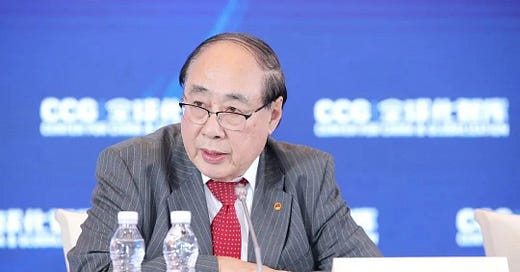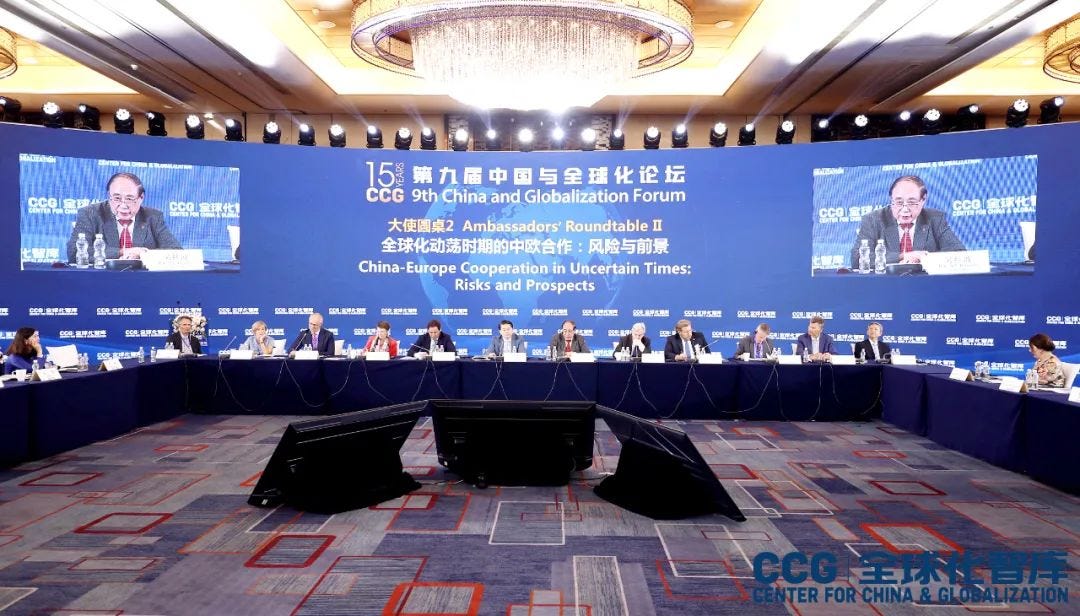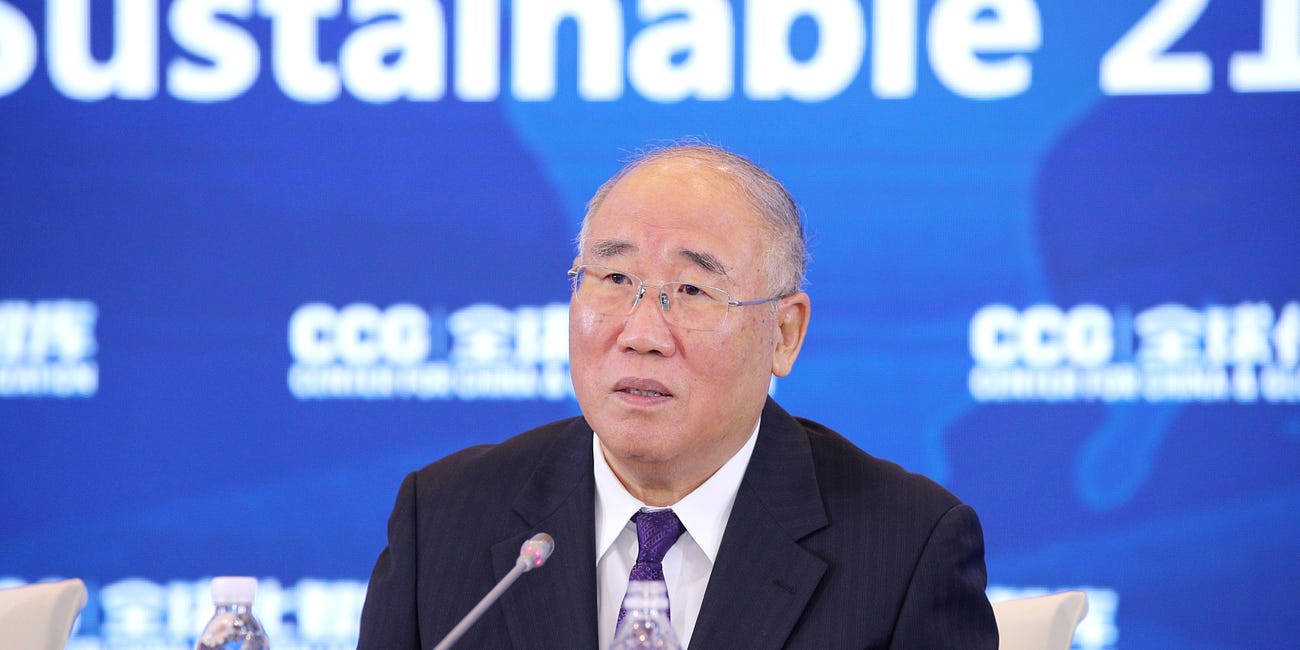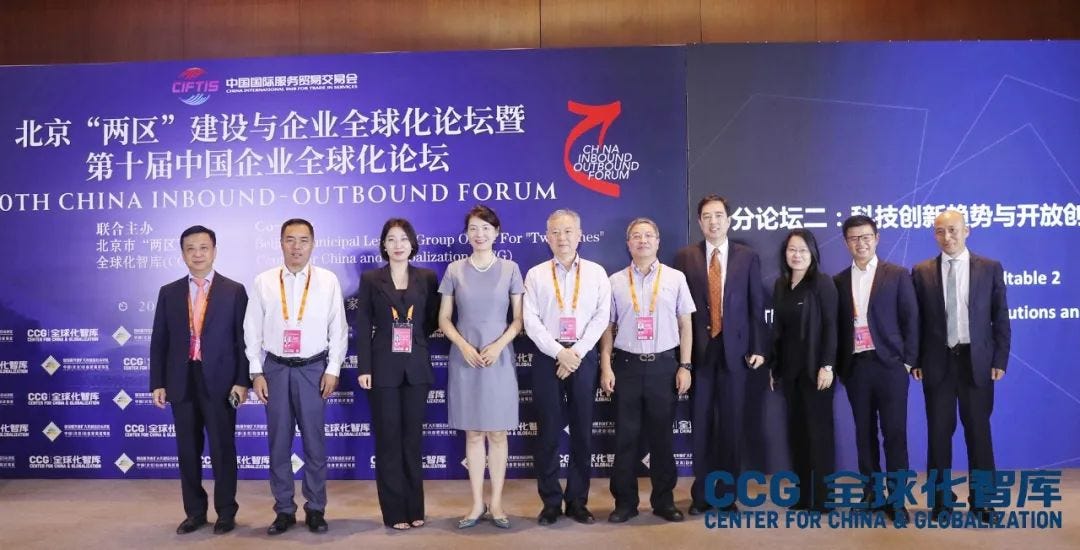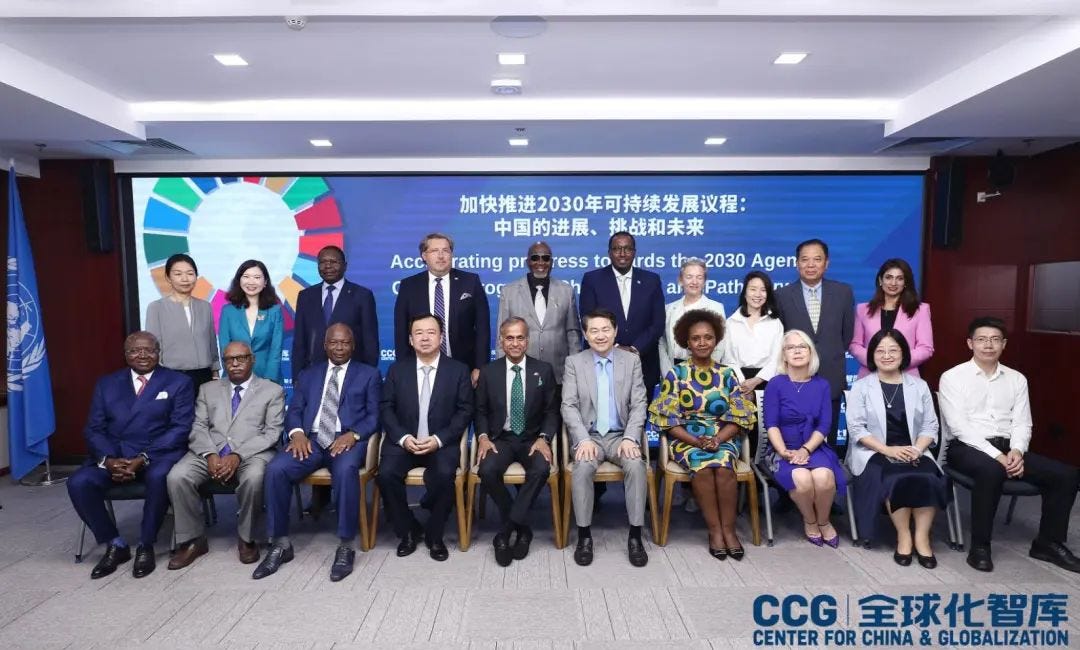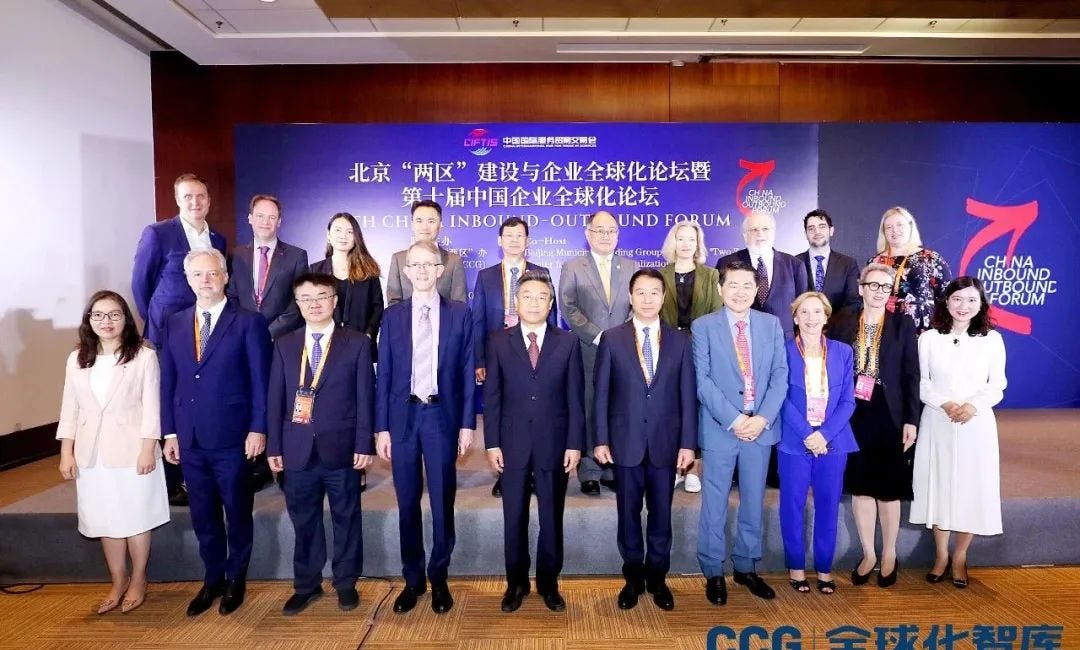Wu Hongbo addresses human rights, Ukraine, trade, etc. for European ambassadors
China's Special Representative on European Affairs emphasized support for human rights, China's contributions to peace in Ukraine, and cooperation against influence from "across the Atlantic Ocean".
Wu Hongbo, Special Representative of the Chinese Government on European Affairs, addressed a roundtable of European ambassadors at CCG’s 9th China and Globalization Forum on Sept. 21 in Beijing.
His audience included Jorge Toledo Albiñana, Ambassador of the European Union to China, Rafael Dezcallar, Ambassador of Spain (which currently holds the rotating presidency at the Council of the European Union), alongside Ambassadors of Germany, Estonia, Iceland, Croatia, Finland, Denmark, Austria, etc.
Wu'a speech garnered extensive media coverage from Global Times, China Daily, China Review News Agency, Beijing Daily, and Phoenix Television.
In his keynote speech, Wu addressed pressing issues in China-EU relations, such as the EU's three-positioning approach towards China, de-risking measures, and strategic autonomy of the EU. Wu described the EU's three-positioning approach as baffling and contradictory; expressed his unwavering belief that China and the EU should unite to oppose de-risking measures and maintain a fair playing field; and cautioned against "block confrontation," Cold War mentality, and undue influence from "across the Atlantic Ocean". Wu also highlighted China's commitment to contributing positively to global challenges such as the war in Ukraine and sustainable development.
The panel discussion saw Wu adopting a more direct and forthright tone. When discussing the conflict in Ukraine, he posed two probing questions to the ambassadors: have you ever considered many countries in the world refuse to take sides? Do we forget the miserable life of Iraqi people when they were invaded by a permanent member of Security Council without approval of United Nations authority, and how that country was let away easily? While drawing attention to the double standards in international affairs, Wu also underscored China's persistent efforts and unwavering commitment to contribute to peace in Ukraine.
In response to concerns about human rights in China, Wu reaffirmed China's steadfast support for both civil and political rights, as well as economic, social, and cultural rights. He highlighted China's notable success in alleviating poverty as a testament to its commitment to improving the lives of its citizens. Furthermore, Wu highlighted the issue of national security being stretched to unreasonable extents, using cases like Huawei and ASML to oppose the concept of "derisking" and advocate for a rules-based international order with the United Nations at its core.
This year marks 20th anniversary of the comprehensive strategic partnership between China and the European Union. It is really a good time for us to sit down and review the past and the way forward. As we understand, we have been troubled over the past three years by COVID-19; our exchanges, visits and business cooperation have been virtually stopped, or semi stopped.
Happily, we restarted our contacts. Since last year, the leaders from Germany, the European Union, Spain, and France have visited China. And the Chinese new Prime Minister, Mr. Li Qiang, after taking his office, visited both Germany and France, and many European countries’ foreign ministers, and deputy foreign ministers, and delegations at different levels come to China, and the number of visits is increasing daily. In the first seven months, the Chinese delegations at the deputy minister level visited European countries, reached over 200. Myself, I visited Europe three times this year, attending two important international seminars.
As far as trade is concerned, last year, the trade volume between China and the European Union reached USD 847.3 billion dollars, hitting all-time high. This year, we’ve been told, in the first five months, the bilateral trade between us increased by 3.6 %. The world economic recovery and green transition will give more opportunities and new momentum to the economic and trade cooperation, and the relations between our two sides.
On top of that, we see increased exchange of personnel. We have more visitors going to Europe with increased air services. These exchanges, including business operation, do increase the mutual understanding and further enhance our practical cooperation. Personally, I have a very positive and optimistic view of the future of the relations between China and the European Union.
When we talk about progress and achievements, we should not forget the challenges. These are two sides of one coin. As far as the challenges we face in our bilateral relations, number one, I will single out the three positioning of EU’s China policy [partner, competitor and systemic rival]. I shared with you my view last night, I would not repeat myself. I just want to make one point: China is the key partner for cooperation in areas of maintaining financial stability, dealing with energy crisis, control inflation, improve competitiveness, and to realize EU’s green and digital transition. China would play a role as a key partner for cooperation. But at the same time, such key partner is considered as systemic rival. It is neither reasonable nor logical.
The second point is de-risking. The word before that was decoupling. That was so unpopular, even the country which invented this expression has decided to drop it, to use derisking. European friends have explained to us on many occasions the specific meaning of derisking. Thank you very much for that. However, in the past few months, the reality is the European Union, in addition to reduce the dependence on China in the areas of manufacture chain, production chain, and in the area of critical minerals, has also produced a number of tools and regulations that restrict China’s investment in Europe — even has restricted measures on European enterprises to invest in China. According to our information, last year, 2021, China's direct investment in European Union dropped by 20%, hitting all-time low. On the 13th of September, your President of European Commission announced decision to launch anti-subsidy investigation into Chinese EVs. This has aroused a widespread concern of China and international community. I understand it was also opposed by people from automobile industry in the European Union.
The third is the political correctness. As we see it. The ideology and the values are prevailing over normal business operations. Sometimes the business operations are politicized or even weaponized. Some countries, unfortunately, for the sake of being politically correct, bowed to the pressure of a superpower at the cost of the prosperity and stability of Europe and the interests of its people. For instance, it should be a European country and European company to decide what to sell to China. It should not be a decision made by someone else across the Atlantic Ocean. The block confrontation within, the Cold War mentality is hurting the relations between us. I feel very sorry for that.
Now, the way forward. As I said, I am optimistic and positive about our relations, so I would like to share with you some points that may improve our relations.
Number one, increasing our mutual understanding. The world has more than 220 countries and regions. Each has a different language, culture, religion and way of life. If all the countries or regions are requested to have the same belief, the same religion and the same social system, is neither realistic nor democratic. Three years of COVID-19 have blocked us from seeing each other and talking to each other. As a result, there are quite a few misunderstandings or worries on both sides. So the very first point is that the two sides would sit down and have more exchange of views and see eye-to-eye, to have sincere discussions in order to understand each other better.
Second, to deepen our cooperation. And we see it, this important value of exchanges at the highest level. And we all understand there will be China-EU leaders meeting before the end of this year. In order to prepare this meeting, there would be high-level dialogues on strategic policies, digit, or trade and economic relations. So we do hope that these high-level dialogues would prepare the ground for the final high-level meeting which will lay down the areas and the policies for us to work together in the future.
And second, we should tap the potentials for our cooperation. There are quite a few new areas as already identified by the both sides, like green economy, green transition, digit, artificial intelligence, and advanced manufacturing industry.
The European Union has been a strong supporter of open economy and green development. So fair international competition should be the European green transition's catalyst, and should not be a reason to close its doors. On that note, I sincerely hope that the European Union and their countries be masters of their own house, decide what should be decided by the European Union, or European countries, not be decided across the vast ocean on the other side.
Third, to safeguard peace. China and the European Union are strong supporters of multilateralism, and we are firmly against unilateralism. We are also supporting the international system with the United Nations at its core. And in the past, we worked together in the constructive way in dealing with issues like Iran nuclear issue and Korean Peninsula nuclear issue and the Middle East. We also coordinated and cooperated quite well on issues of climate change, public health, and food. So on that notes, I've no doubt that China and the European Union will continue our coordination and cooperation within the United Nations and G20, and other international organizations.
We do hope together, we are against the new Cold War and block confrontation. and we do hope, with our joint efforts, and efforts of the rest of the world, we could find a political solution as early as possible to the Ukraine Crisis.
Number four, to promote development. We have been discussing about the implementation of SDGs for many years. Just two days ago, the Secretary-General of United Nations, Mr. Guterres, warned international community that of the 17 sustainable development goals and 169 specific targets, only 15 targets are on track, and many other targets are going in reverse. This is very bad news, alarming news to all of us. Without development, there will be no lasting peace in the world. Therefore, both China and the EU should take the lead in implementing the Sustainable Development Goals.
And secondly, we may work together to formulate the rules and regulations in such areas as cross-border data flows, Internet of Things, 6G, artificial intelligence, and so on.
As we both are not in favor of decoupling, the two sides should work together to avoid the scenario that in the world, we’ll have two parallel silos. In each silo, people, countries produce roughly the same thing with the different cost, different quality and different price.
Last but not least, we do hope that both China and European Union dovetail Belt and Road Initiative and Global Gateway. We have been urged, both the European Union and China, to help the developing countries — the poorest, the least developed countries, in particular. By tailing the two initiatives, we will be in a better position to develop the ways and means to help the developing countries and to narrow the gap between the Global South and the Global North.
Last word, the trust is very important. As we see it, many international commitments, high-sounding words are not met. This is very disappointing, as Secretary-General of United Nations said, that the distrust between Global North and Global South is increasing. So with that, my last word is: let's work together to avoid misunderstandings, to build our mutual trust. Work together for both the European Union, for China, for the rest of the world. Thank you.
Panel discussion
Thank you very much. President Wang. It's the first time in China, I'm seriously outnumbered at homeground. You can never see this in China, because there's so many Chinese here, but I've been outnumbered by the ambassadors from the European Union, my friends. And secondly, I would like to respond briefly to some of the points raised by the ambassadors, otherwise I would not do the justice to the panel and the ambassadors.
First, the three positioning of, whatever you call it, "descriptions" or "strategies" — that depends which way you look at it. I heard you loud and clear. I understand your points, but unfortunately, I'm not very convinced. So let's great to disagree.
Let me ask you one question: Do you know the differences between a lawyer and an engineer? I'm saying this, not having the intention to offend anyone. This is a question asked by somebody else to me when I was an ambassador. The answer is: the lawyer making simple things more complicated then charge their clients; engineers are trained to make complex issues simple and solve it. So on this point, I do hope our European ambassadors and EU headquarters will make complex issues simple so that we can move forward with our cooperation.
Secondly, I heard the frequent phrases used by many people "rule-based international order". In the United Nations in the English language, we always use abbreviations like SDGs, MDGs, and so on. I've no objection, but I need further clarification. By "rules", you mean the United Nations Charter or the international laws enshrined in the international conventions passed by the General Assembly. If that is the answer, I fully agree with this and support it. My worry is there are some homemade rules which have only binding force on other countries, not themselves. If that is the case, I'm sorry. I will not accept that. Now, derisking. Maybe I did not make myself clear. I'm sorry for that. Decoupling is the baby of USA. Derisking was invented in Europe. Now, we have been talking about derisking, we have different views. But going along with derisking, there's one thing is worrying: the concept of national security is being overstretched. Take the famous case Huawei, for example. So far, there's no single country coming out with hard facts that this company is threatening their national security. Even then, they were not given level playground.
Let's talk about ASML in the Netherlands. We were having normal business buying DUV machines from ASML. And all of a sudden, they changed it for reasons you all know. So this is not normal business — it has been politicized. So we are both against this politicized business and deal; we both want play ground that's level and treat everybody else as equals; let’s work for that purpose.
Human rights were mentioned almost by each and every ambassador. The human rights derives from the Declaration of Human Rights of the United Nations. I don't know whether the ambassadors sitting here know why, instead of one covenant, we came out of two. One is civil and political; the other is economic (, social) and cultural. Why you got two instead of one? I can tell you ambassadors: at the very beginning, the developed countries and developing countries have differing views. The developed countries saying, if you have your political rights, civil rights, then the social wealth, the cultural will come with these rights. But actually not. And so the United Nations cannot have the two groups brought together. So the General Assembly decided to have two covenants, one on civil and political rights, one on economic, social and cultural rights.
So to emphasize one covenant is not right. We, in China, we support both covenants. We support all the human rights. It's hard to imagine that the country who spent four decades to pull out as many as 800 million people out of extreme poverty, is at the same time a serious of violator of human rights.
Now, the Ukraine issue has been mentioned by almost all ambassadors, and the China-Russia relations are also involved. I heard you very carefully, and your arguments were repeated to me during my visits to European countries. Let me first say China-Russia relations. We are big neighbors. The neighbors cannot be relocated. Russia is also the European country's neighbors, and that can also not be relocated. The relations between China and Russia are of no iron lines, no confrontation. China-Russia relations are not directed against any third parties, nor subject to any third parties.
About the Ukraine issue, we have very deep sympathy for the Ukraine people. The Chinese engineer students were the last group of people to be pulled out from that country. We supplied with some humanitarian goods to Ukraine, and we appointed Special Representative, my colleague, the former Vice Minister, to deal with this issue. And he traveled to countries including Ukraine and also participates in international conventions or meetings.
Well, I think ambassadors, by listening to you, we are not doing enough; we should do more. Let me say this: have you ever considered many countries in the world refuse to take sides? Not because they have no principles, or they do not know anything. I think one of the European Prime ministers, after visiting some countries, tried to convince other countries' leaders. He said, they are not against our principles, they are against our double standards. So we have been reminded the miserable lives of Ukraine people. Yes, we show sympathy. And do we forget the miserable life of Iraqi people when they were invaded by a permanent member of Security Council without approval of United Nations authority, and how that country was let away easily? So that people, they have a much longer memory. They remember that.
Having said all that, China is, in its own way to push the possibility of a peaceful settlement through diplomatic negotiations. At the very beginning, as mentioned, China made four points. Number one, the sovereignty and territorial integrity of a sovereign country must be respected. The United Nations Charter, and rules and regulations must be abided by. The legitimate concerns of a sovereign state must be given the due regards. And efforts must be encouraged to deescalate the tension. And later on, we published our position paper on Ukraine situation. This is an ongoing process. China is ready to work with the United Nations, with the European Union and other countries to find a solution.
At this moment — I think you know better than me — is not the time for the two parties to sit down for negotiations. That does not mean there will be no opportunity in the future. So that's not give up our efforts. China will continue to contribute to the possible solution to the crisis in our own way. In doing so, we are ready to listen to you and to others to see if we can do more.
Having said all that, I just want to say I like this panel very much. To have a face-to-face discussions and debates, and sometimes really sharp words, but we do understand each other much better. So thank you very much, ambassadors.

